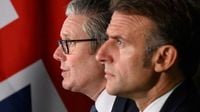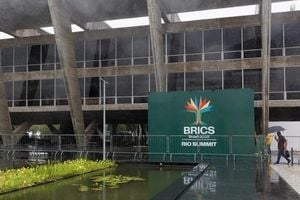Diplomatic tensions are mounting across the Western world as the long-running Israeli-Palestinian conflict reaches a new crossroads. In a dramatic series of exchanges this August, Israeli Prime Minister Benjamin Netanyahu lashed out at several Western allies—including France, Australia, and the UK—as they prepare to formally recognize a Palestinian state during the United Nations General Assembly in September 2025. The dispute has exposed deepening rifts not only between Israel and its partners, but also within the broader international community, as historical grievances and present-day humanitarian crises collide.
On August 19, 2025, Netanyahu sent strongly worded letters to French President Emmanuel Macron and Australian Prime Minister Anthony Albanese. In these letters, which were obtained by CNN and widely reported by outlets including Egypt Independent and Middle East Eye, Netanyahu accused both leaders of fueling antisemitism by supporting Palestinian statehood. He wrote to Macron, "Your call for a Palestinian state pours fuel on this antisemitic fire. It is not diplomacy, it is appeasement. It rewards Hamas terror, hardens Hamas’s refusal to free the hostages, emboldens those who menace French Jews and encourages the Jew-hatred now stalking your streets."
The French response was swift and unequivocal. The Elysee Palace noted that Macron first learned of the Israeli letter through the press, not diplomatic channels, and issued a statement: "France protects and will always protect its compatriots of the Jewish faith. These times demand seriousness and responsibility, not confusion and manipulation." This sharp exchange highlighted the growing gulf between Netanyahu and Western capitals, many of which have become increasingly critical of Israel’s ongoing war in Gaza and its devastating humanitarian consequences.
The upcoming recognition of Palestinian statehood by France and Australia is set to coincide with the opening of the UN General Assembly’s high-level debate on September 23, 2025—a date that also marks the Jewish New Year. These two countries will join over 140 others that already recognize Palestinian statehood, a move that has drawn both praise and condemnation from around the globe. The United Kingdom and Canada have also announced their intentions to support recognition, with the UK making its decision conditional on Israel agreeing to a ceasefire in Gaza.
Netanyahu set a deadline for France and Australia to take action against what he described as the "cancer" of antisemitism before the Jewish New Year. According to Egypt Independent, this ultimatum is seen as part of a broader campaign to pressure Western allies into reconsidering their positions on Palestinian statehood and the Gaza conflict. However, the tactic appears to have backfired, with several Western leaders expressing frustration and, in some cases, outright disdain for Netanyahu’s approach.
Tensions between Israel and Australia have been particularly acute. After Canberra announced its intention to recognize a Palestinian state and imposed sanctions on far-right Israeli ministers Bezalel Smotrich and Itamar Ben-Gvir in June 2025, the crisis deepened when Australian Home Affairs Minister Tony Burke denied an entry visa to another far-right Israeli politician, Simcha Rothman. In retaliation, Israeli Foreign Minister Gideon Sa’ar revoked the residence visas of Australian representatives in the Palestinian Authority and directed Israel’s embassy in Canberra to scrutinize every official Australian request for a visa to Israel.
Netanyahu did not stop there. On August 20-21, 2025, he publicly denounced Albanese as a "weak politician" on social media, declaring, "History will remember Albanese for what he is: A weak politician who betrayed Israel and abandoned Australia’s Jews." Albanese, for his part, remained composed, telling local reporters, "I treat leaders of other countries with respect, and I engage with them in a diplomatic way. I do not take it personally." Burke, the Australian Home Affairs Minister, offered a pointed rebuttal, stating on the ABC, "Strength is not measured by how many people you can blow up or how many children you can leave hungry."
The diplomatic drama is unfolding against a backdrop of shifting European attitudes. In July 2025, France and the UK formally announced their intentions to recognize a Palestinian state at the upcoming UN meeting, a development that Middle East Eye describes as both "too little, too late" and a potential turning point. The article draws attention to the colonial-era decisions of France and Britain—such as the 1916 Sykes-Picot Agreement and the 1917 Balfour Declaration—which laid the groundwork for much of the modern Middle East’s turmoil. The piece argues that the two countries bear significant historical responsibility for the region’s ongoing conflicts and suggests that domestic political considerations, including low approval ratings and the need to appeal to Muslim minorities, may be motivating their leaders.
British Prime Minister Keir Starmer has presented the UK’s potential recognition as conditional, stating it hinges on Israel ending atrocities in Gaza. Legal experts cited by Middle East Eye have labeled the situation in Gaza as genocide, and images of starving children have galvanized public opinion in Europe, prompting a shift in policy. Yet the article notes that the real test for European democracies will be whether they are willing to go beyond symbolic gestures—such as recognition—and take concrete actions to halt military assistance to Israel or impose sanctions, as smaller states like Ireland and Slovenia have done.
Israel and the United States have both condemned the recognition plans, insisting that such moves "reward terror" and undermine the peace process. Israeli far-right finance minister Bezalel Smotrich bluntly told the BBC, "It’s not going to happen. There will be no state to recognise." The prevailing sentiment in the Israeli government is that recognition of Palestinian statehood remains a bargaining chip, and that Israel must have the final say.
Meanwhile, there have been some glimmers of hope. In August 2025, Hamas formally accepted a Gaza ceasefire proposal presented by mediators Egypt and Qatar, as reported by Middle East Eye. Yet, skepticism remains high about whether this will bring lasting relief to Palestinians, given the entrenched positions of Israel and the United States. In a controversial statement, US President Donald Trump declared on August 20, 2025, that both he and Netanyahu were "war heroes," an assertion widely seen as tone-deaf amid the ongoing suffering in Gaza.
As the UN General Assembly approaches, the world watches to see whether the symbolic recognition of Palestinian statehood by Western powers will translate into meaningful change—or simply add another chapter to a century of broken promises and diplomatic stalemate. The coming weeks will reveal whether these gestures can help revive the long-stalled two-state solution or merely deepen the divides that have defined this conflict for generations.




